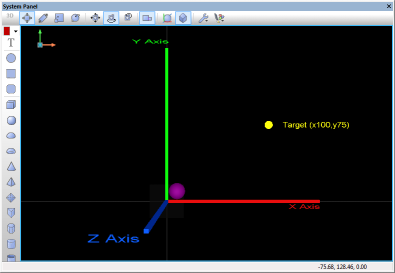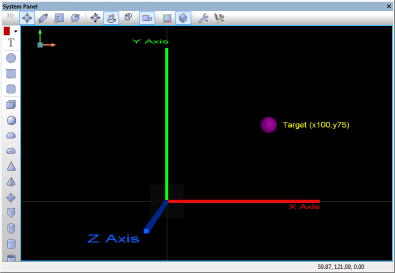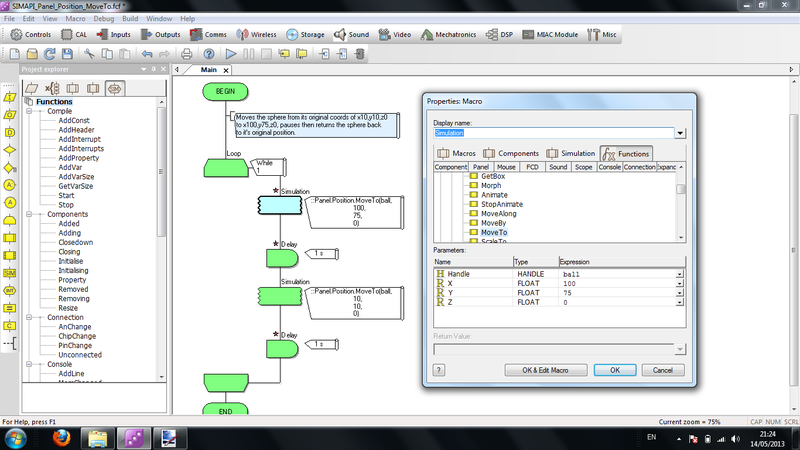Difference between revisions of "API Panel.Position.MoveTo"
(XML import) |
|||
| Line 1: | Line 1: | ||
| − | + | {| class="wikitable" style="width:60%; background-color:#FFFFFF;" | |
| − | + | |- | |
| − | + | | width="10%" align="center" style="background-color:#D8C9D8;" align="center" | [[File:Fc9-comp-macro.png]] | |
| − | + | | width="90%" style="background-color:#D8C9D8; color:#4B008D;" | '''MoveTo''' | |
| − | === | + | |- |
| − | [[ | + | | colspan="2" | Moves the object to the given coordinates relative to its parent |
| − | : | + | |- |
| − | :: | + | |- |
| − | + | | width="10%" align="center" | [[File:Fc9-h32-icon.png]] - HANDLE | |
| − | + | | width="90%" | Handle | |
| − | + | |- | |
| − | == | + | | colspan="2" | The position or component to update |
| − | [[ | + | |- |
| − | + | | width="10%" align="center" | [[File:Fc9-f32-icon.png]] - FLOAT | |
| − | + | | width="90%" | X | |
| − | + | |- | |
| − | [[ | + | | colspan="2" | Local coordinate X to update with |
| − | + | |- | |
| − | + | | width="10%" align="center" | [[File:Fc9-f32-icon.png]] - FLOAT | |
| − | [[ | + | | width="90%" | Y |
| − | + | |- | |
| − | + | | colspan="2" | Local coordinate Y to update with | |
| − | [[ | + | |- |
| − | + | | width="10%" align="center" | [[File:Fc9-f32-icon.png]] - FLOAT | |
| − | + | | width="90%" | Z | |
| − | + | |- | |
| − | == | + | | colspan="2" | Local coordinate Z to update with |
| − | '' | + | |- |
| + | | width="10%" align="center" style="border-top: 2px solid #000;" | [[File:Fc9-void-icon.png]] - NONE | ||
| + | | width="90%" style="border-top: 2px solid #000;" | ''Return'' | ||
| + | |} | ||
Latest revision as of 11:41, 16 January 2023
Detailed description
This moves a position to a set of absolute coordinates in its parents coordinate space. That is, the center of the parent object is considered to be (0, 0, 0).
This call is a compliment to MoveBy.
Examples
Calling in a calculation
- Add to a calculation icon:
::Panel.Position.MoveTo(handle, x, y, z)
Flowcode example file
Download ![]() SIMAPI_Panel_Position_MoveTo and open it in Flowcode v6. In this example, there are three cubiods that represent Axis X,Y,Z. Note they are coloured exactly as the panel axis indicator which represents your viewing position. There is a sphere also on the panel.
SIMAPI_Panel_Position_MoveTo and open it in Flowcode v6. In this example, there are three cubiods that represent Axis X,Y,Z. Note they are coloured exactly as the panel axis indicator which represents your viewing position. There is a sphere also on the panel.
The MoveTo(h,x,y,z) function moves the object specified to a new set of coordinates. In the example file, the program moves the sphere from it's original location of x10,y10,z0 to x100,y75,z0, waits a second and then moves the sphere back to it's original coordinates.
The screenshots below show the effect and also highlight the code used by the example.


